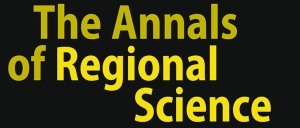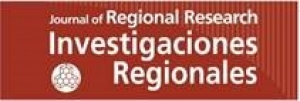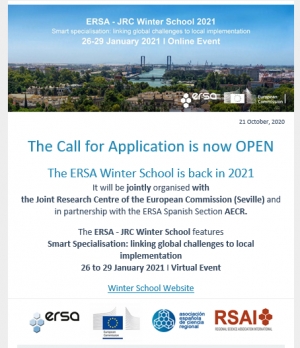RSPP Special Issue Award
Elisabete Martins
RSAI councilors-at-large Election | Deadline for voting extented until November 8, 2020
We inform that the election of RSAI Councillors was extended. You must (RSAI members) have received the RSAI Voting invitation.The deadline for voting is now November 8, 2020!
The Annals of Regional Science, Volume 65, Issue 3 - New Issue Alert
|
||||||||
|
||||||||
|
||||||||
|
||||||||
|
||||||||
|
||||||||
|
||||||||
|
||||||||
|
||||||||
|
||||||||
|
||||||||
|
||||||||
|
||||||||
|
||||||||
|
||||||||
|
||||||||
|
||||||||
|
||||||||
|
||||||||
|
||||||||
|
||||||||
|
||||||||
|
||||||||
|
||||||||
|
||||||||
|
||||||||
|
||||||||
|
||||||||
|
||||||||
|
||||||||
|
||||||||
|
||||||||
|
New Issue (Special Issue 48) of Investigaciones Regionales - Journal of Regional Research
Summary of Volume 48 Investigaciones Regionales - Journal of Regional Research
Volume 48 of the journal Investigaciones Regionales – Journal of Regional Research is dedicated to the study of Territorial Servitization. This special volume has been edited by Ferran Vendrell-Herrero (University of Birmingham), Esteban Lafuente (Universitat Politècnica de Catalunya) and Yancy Vaillant (TBS Business School). The three coordinators of the volume open it with an Editorial in which, in addition to introduce the published works, they summarize the body of existing knowledge on territorial servitization, quantify and map the servitization activity in the Spanish autonomous communities, and raise a number of issues still unresolved that deserve more academic attention
In this special issue, Araya, Horváth & Leiva provide more nuances on the antecedents of KIBS formation. They evaluate the catalytic power of manufacturing industry to promote change in the rate of business service firms, which constitutes a relevant antecedent to territorial servitization. More specifically, their study analyses the impact of quantitative characteristics (size and relative weight) of the manufacturing sector, while acknowledging the potentially moderating role of local competitive conditions that may explain the different dynamics in the rate of business service firms across territories. After employing panel-data models on a sample of 81 Costa Rican counties during 2010-2016, the findings are twofold. First, they demonstrate that structural change towards increased specialization in business services only takes place in counties with a large manufacturing base (a critical mass), while the relative weight of the industry within the local economy does not have an impact. Second, results indicate a substitution effect among the size of the manufacturing industry and local competitiveness: a competitive local environment can compensate the lack of a large manufacturing base, whereas a larger manufacturing base even in a low-competitive region can potentially contribute to increasing rates of business service firms.
A second contribution on the same domain is the article of Zubiaurre-Goena and Sisti. It uses a rich panel database covering the seventeen Spanish regions for the period 2000-2016 formed by merging secondary data from multiple sources (Spanish Statistical Office (INE), Eurostat, and BvD). Interestingly, the study recognizes KIBS heterogeneity by differentiating into three types: technical KIBS (T-KIBS), computer-related services (C-KIBS), and “traditional” professional services (P-KIBS). The results of the study suggest that KIBS antecedents depend on the type of KIBS analysed. Regions with stronger innovation systems are more likely to generate P-KIBS and T-KIBS, whereas regions with more manufacturing quality are more likely to generate C-KIBS.
Opazo-Basáez, Narvaiza-Cantín & Campos follow a qualitative approach to evaluate the importance of geographical proximity in the manufacturing-KIBS collaboration. They used two case studies in the Basque Country. In both cases, the manufacturing company is in the Basque Country. However, they collaborate with KIBS firms from different geographical areas, “inside” and “outside” the Basque region. Their evidence proposes that geographical distance plays a key role on the KIBS-Manufacturer relationship for servitization capacity, the greater the geographical proximity the better.
Seclen-Luna and Moya-Fernandez seek to evaluate to what extent the proximity to KIBS firms is beneficial to manufacturing firms’ capacity to innovate. Drawing on the World Bank Enterprise Survey (WBES) for eleven Latin-American countries, they analysed 3,029 manufacturing firms, with the purpose to uncover the relationship between KIBS co-locations and the innovativeness of the manufacturing firms. Findings indicated that manufacturing firms’ locations based on KIBS proximity, is a critical determinant of product innovation, which could facilitate the adoption of servitization strategies and introduce value-adding services into their operations.
Finally, Marino and Trapasso address a fundamental question: whether industrial policy is best designed based on the development of a knowledge intensive service economy having the same focus for all regions (one size fits it all) or if there are certain intrinsic characteristics that make it necessary for regions to customize their industrial policy. To respond this question, advanced and peripheral regions are considered (Wyrwich, 2019). The study analyses Italian regions for the period 2009 to 2014. It is found that the accumulation of capital and the ability to develop the service economy are main drivers of regional competitiveness. This means that peripheral regions with fewer resources (capital) and capacities (services) must redirect their efforts in achieving the necessary pre-conditions of territorial servitization. In other words, there are sufficient and necessary conditions to be able to develop territorial economic systems with a strength in knowledge-based services. In the case of not having said conditions, policy makers should first prioritize the construction of the said conditions.
To contact Us and Submit Manuscripts:
Investigaciones Regionales – Journal of Regional Research
Email: This email address is being protected from spambots. You need JavaScript enabled to view it.
The article will be sent through the portal Open Journal System (OJS) of the Spanish Repository of Science and Technology (RECYT): https://recyt.fecyt.es/index.php/IR/login
ISSN: 1695-7253 E-ISSN: 2340-2717
If you do not wish to receive e-mail updates from us This email address is being protected from spambots. You need JavaScript enabled to view it..
I Festival Internacional de Curtas Metragens de Insumo-Produto – “Curta Leo”
I Festival Internacional de Curtas Metragens de Insumo-Produto – “Curta Leo”
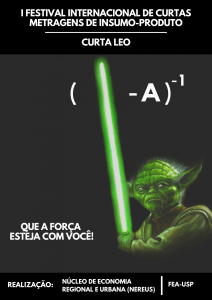
Vídeos de divulgação dos resultados dos trabalhos de conclusão elaborados pelos alunos da disciplina Modelos Aplicados de Equilíbrio Geral I do Programa de Pós-Graduação em Economia da FEA-USP.
Os participantes são provenientes de 21 Unidades da Federação e oito países, sendo 11 de Angola. Este estudo avalia o impacto social desta iniciativa do PPG em Economia da FEA-USP.
Patrono do Festival: Sidney Garambone, jornalista e escritor, é editor dos programas Bem, Amigos!, Boleiragem, Grande Círculo e Segue o Jogo nos canais Globo.
PRÊMIO JÚRI POPULAR
Instruções para votar:
1. Entre neste link: https://b.socrative.com/login/student/
2. Complete o Room Name com a seguinte informação: CURTALEO
3. Selecione seu(s) vídeo(s) preferido(s)
4. Submeta a sua resposta
OBS.: Votação encerra no dia 26 de outubro de 2020, às 23:59.
Vídeos
Impactos do lockdown parcial do COVID-19 no turismo em Curitiba-PR
Alexandre Ricardo de Aragão Batista, Elen Presotto, Évilly Carine Dias Bezerra, Plinio Esteban Ramírez Alvarez, Priscila Soares dos Santos
Serviços KIBS em Minas Gerais: uma análise a partir do arranjo populacional de Belo Horizonte
Damares Lopes Afonso, Guilherme Silva Cardoso, Lucas Leão Fernandes Ferreira, Nathália Sbarai
Impactos do Círio de Nazaré na economia do Pará: uma análise de insumo-produto
Andréa Bento Carvalho, Alex Rilie Moreira Rodrigues, Camili Dal Pai, Cláudio Eurico Seibert Fernandes da Silva, Natalie Paula Ferreira Devloo, Paulo Roberto de Sousa Freitas Filho, Sérgio Felipe Melo da Silva, Thais Diniz Oliveira
Notícia sobre o trabalho em “O Liberal” – 10-11 de outubro de 2020
Interdependência econômica regional e movimentos pendulares
Caroline Andressa Welter, Daniel Amorim Souza Centurião, Rayan Wolf, Tânia Moreira Alberti
Luciano Ferreira Gabriel, César Piorski, Rafael Capaz, Victor Valério
Comércio de água virtual: uma análise de insumo-produto para a Bahia
Olga Hianni Portugal Vieira, Carolina Silva Ribeiro, Maíra Ferraz de Oliveira Silva, Marianne Costa Oliveira, Enrique Noel Orellana
O que acontece em Brasília fica em Brasília
Daniel Massen Frainer, Felipe de Sá Tavares, Iago Luiz da Silva, José Henriques da Silva Ribeiro Júnior, Lucas Eduardo Veras Costa, Luiz Augusto Ferreira Magalhães, Marcio Guerra Amorim, Wesley Osvaldo Pradella Rodrigues
Bruna Maria Oliveira Benitres Ferreira Barone, Cleyzer Adrian da Cunha, Larissa Barbosa Cardoso
Fernanda Johnston, Gustavo Castro, Michelle Martins, Renata Moura Sena
Elizama do Nascimento Oliveira Campos, Lidiane de Almeida Modesto, Raime Rolando Rodríguez Díaz
Guilherme Penha Pinto, Joel Quevedo de Matos, Leonel dos Santos Silveira, Rodrigo da Rocha Gonçalves
Ademir Pedro Vilaça Júnior, João Ricardo Ferreira de Lima, Laudenor Morais Correia de Melo Assunção, Leandro Willer Pereira Coimbra
Regina Ávila Santos, Daniel Silva Antunes de Carvalho, Rodrigo Barbosa de Cerqueira, José Firmino de Sousa Filho, Ronisson Lucas Calmon da Conceição
Impacto Inter-regional da PEC emergencial: uma análise para as economias pernambucana e brasileira
Maria Isabel Souza, Johnny Barbosa de Almeida, Kleyton José da Silva Pereira, Ariane Danielle Baraúna da Silva, Thiago Fellipe Lima Silva Perreira
Income and consumption in Sao Paulo Metropolitan Area: a Miyazawa analysis
Guilherme Augusto Asai, Marcelo Koji Kawabata
Hélder Marcelino, César Pakissi, Edmelson da Silva, Fernando Mutondo, Paulo Victor da Costa
Alcides Nunda, Mbahu Isaac Cainda, Abel Bonga, João Jeremias, Pedro Chitandula, Horácio Cauto
O impacto econômico da extração hipotética do setor industrial do Estado do Rio de Janeiro
Thiago Costa Soares, Joilson de Assis Cabral, Lucas Siqueira de Castro, Everlam Elias Montibeler, Celso Bissoli Sessa, Caio Peixoto Chain
Critérios de avaliação
Comissão de frente – A abertura do desfile, os primeiros argumentos que justificam a realização do estudo (motivação)
Evolução – Neste quesito é avaliada a consistência e a maneira como o grupo desenvolve o vídeo (vende a ideia)
Enredo – É o roteiro do vídeo. A partir dele que são elaborados samba-enredo, alegorias e fantasias
Samba-enredo – Os jurados têm que avaliar o conhecimento do grupo sobre o problema apresentado
Alegoria e adereço – A qualidade e a organização da apresentação (avaliação da forma e não do conteúdo)
Mestre-sala e porta-bandeira – É avaliada a capacidade do grupo em “proteger” o estandarte da escola (ideia do trabalho)
Bateria – Criatividade e versatilidade para manter a atenção dos espectadores
Harmonia – Sincronia entre a proposta de pesquisa e os resultados apresentados
Fantasia – Precisa ter uniformidade nos detalhes e bom acabamento/edição
Andamento da apresentação – O vídeo não pode exceder 5 minutos (para cada minuto além ou aquém haverá a perda de 1 ponto)
ERSA-JRC Winter School 2021 - The Call for Application is OPEN
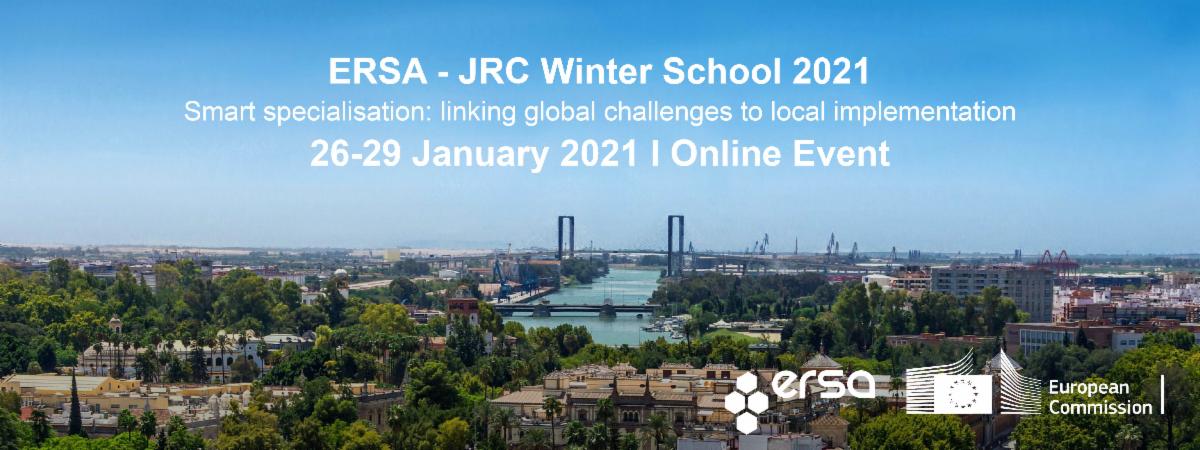
21 October, 2020
The Call for Application is now OPEN
The ERSA Winter School is back in 2021
It will be jointly organised with
the Joint Research Centre of the European Commission (Seville) and
in partnership with the ERSA Spanish Section AECR.
The ERSA - JRC Winter School features
Smart Specialisation: linking global challenges to local implementation
26 to 29 January 2021 I Virtual Event

Who should apply
We particularly welcome applications from young researchers looking for state-of-the art knowledge around the topic of #smartspecialisation, willing to present their research and get precious feedback from outstanding professors and experts.
 Don't miss out > Submit your Application
Don't miss out > Submit your Application
Target: Doctoral and Postdoctoral students as well as junior researchers with less than 5 years of experience.
Places are limited to 30 Participants
> Deadline: 15 November 2020
> About the Winter School topic
The ERSA - JRC Winter School 2021 seeks to address the interaction between empirical, theoretical and policy analysis with the following topics, which include (but are not limited to):
Data Analyses
Applied Analysis
Quantitative methodology
#smartspecialisation #S3implementation #greendeal #implementation #transformationofplaces #sustainability #territorialpolicies #regionalscience #EDPprocesses #lessonslearned #monitoring&evaluation
Job Position | Economist/Senior Economist, Federal Reserve Bank of Kansas City
The Economic Research Department of the Federal Reserve Bank of Kansas City seeks to hire a new or experienced Ph.D. economist with research interests in regional or urban economics, preferably with an interest in local economic development and understanding differences in rural versus urban outcomes more broadly. Primary responsibilities include advising the Bank's president and senior management on policy issues, writing and presenting research findings in peer-reviewed journals, and writing articles for the Bank's external publications. Qualified candidates possess strong analytical and communication skills, and demonstrate the potential to collaborate with other researchers. A Ph.D. in economics, agricultural economics or relevant field is required. Excellent resources include a collaborative work environment, high-quality research assistants, a high-performance computing environment, and an in-house Federal Statistical Research Data Center (RDC). The Federal Reserve Bank of Kansas City is an equal-opportunity employer.
The link to apply is here.
Application deadline: 12/1/2020
International training course on Integrated Urban Water Management
Integrated Urban Water Management for better resilience in cities - Training Course
7-11 December 2020 (4 hours of learning each day)
Deadline of application: 10 November
UN-Habitat in collaboration with the International Urban Training Centre (IUTC), Gangwon Province, Republic of Korea are inviting applications from those who are senior decision-makers, city managers and urban development practitioners from Asian and Pacific cities to apply for the International Integrated Urban Water Management training course.
The course aims to provide training participants applicable understanding of the principles of Integrated Urban Water Management (IUWM) in cities, and how these principles can be applied in an equitable way and help to achieve SDG 6 on improving access to water and sanitation for all, at the same time address higher resilience and sanitation services in the cities, especially in the context of COVID-19 pandemic.
Participants will be exposed to the broad sphere of water actors that participate in the implementation of water services so that at the end of the course, they will be able to initiate the process of developing and applying IUWM action plan in their home cities. The course will give them the tools to analyse their urban and institutional environments in order to select the best choice opportunities for implementing IUWM.
Friday, October 23rd - REAL/PUCRS Fall Seminar

REAL focuses on the development and application of systemic economic models at the urban and regional levels. Since 2015, REAL has hosted more than 110 graduate students and visiting scholars from China, Brazil, Colombia, USA, Chile, and Spain among other countries.
|
WIRE 2020 | The future of resilient regions in the new ERA (online edition), 4-6 November
Week of Innovative Regions in Europe (WIRE) is the main European policy forum for innovation and regional development. The conference provides a platform for policy makers, public authorities, knowledge centers and enterprises to discuss research and innovation (R&I) practices, challenges and opportunities throughout the European regions, with a direct view on the current and future EU funding programs.
This year, the University of Split, Faculty of Economics, Business and Tourism (Croatia) will host the 11th edition of the “Week of Innovative Regions in Europe“ - WIRE XI 2020 in Split, Croatia.
Due to the exceptional circumstances (COVID-19) event will be organised online. The online event is organized under the agenda of the Croatian EU Council Presidency 2020, with the support of European Commission, Directorate General for Research and Innovation and relevant national authorities: Ministry of Science and Education, Split-Dalmatia County and City of Split.
Attend the WIRE XI 2020 online (4-6 November). Register for free > https://wire2020.eu/Registration
Spanish Section | I International on-line Conference on Regional Science, November 26-27, 2020

Dear members and colleagues of the Spanish Association of Regional Science,
As you know, the circumstances we are experiencing have forced us to postpone our annual meeting to 2021. Hopefully by the fall of next year the situation will be safer and we can meet and enjoy our International Conference on Regional Science. Meanwhile we have organized what I think is a very interesting and dynamic virtual meeting that, although it does not intend to replace our face-to-face meeting, I believe that it will provide us with the appropriate space to generate interaction and reflection from our community.
The theme of this I Online Conference of Regional Science is “Cities and regions in times of COVID-19”.
On November 26 and 27 we will celebrate this online meeting in which we will have an extraordinary plenary conference, given by Professor Andrés Rodríguez-Pose, and an exceptional round table on the impacts on cities and regions of the global health crisis, given by Professors Phill McCann, Alessandra Faggian and Raúl Ramos. In addition, we have prepared poster sessions to discuss our work in progress and a course on geo-referenced data analysis that will be taught by Daniel Arribas-Bell and Federico Pablo-Martí.
I want to thank the great work that the local organizing committee and the scientific committee are doing. You have all the information about this virtual meeting in this link https://reunionesdeestudiosregionales.org/madridvirtual2020/ or in the pdf brochure that we attach with this email.
Registration and participation in all activities is completely free for AECR members.
The cost for non-members is 100 euros, although I encourage you to join for a lower cost and be able to participate in both this activity and all the advantages of being a member of the AECR, including full membership in both the European Regional Science Association (ERSA) and the Regional Science Association International (RSAI).
Write down the dates of this event. We count on your participation. We will send you the call for the poster sessions and other additional information shortly.
Warm regards,
Fernando Rubiera Morollón
President of the Spanish Association of Regional Science
Link to the pdf of the Meeting brochure
About Us
The Regional Science Association International (RSAI), founded in 1954, is an international community of scholars interested in the regional impacts of national or global processes of economic and social change.


